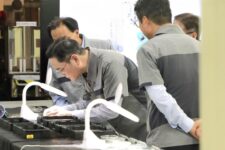
Samsung chief Lee Jae-yong stresses importance of advanced capacitor for cars

Samsung Electronics Executive Chairman Lee Jae-yong, center, looks at manufacturing equipment for multi-layer ceramic capacitors during his visit to Samsung Electro-Mechanics’ plant in Calamba, Philippines, Sunday (local time). Courtesy of Samsung Electronics
Tech giant continues betting high on automotive components
By Nam Hyun-woo
Samsung Electronics Executive Chairman Lee Jae-yong stressed the importance of securing an early lead in manufacturing advanced automotive capacitors, in line with the tech giant’s strategy to expand its electronic components business for vehicles.
Samsung said Monday that Lee visited Samsung Electro-Mechanics’ plant in Calamba, Philippines, on Sunday and was briefed about the latest updates to the plant’s manufacturing process for multi-layer ceramic capacitors (MLCCs).
MLCCs play a critical role in electronic circuits by storing electrical charge and releasing it when needed, thus stabilizing the flow of electricity to semiconductors.
Described as “a dam for electricity,” it helps prevent fluctuations in the current that can cause electronic devices to malfunction. It is widely used for a wide range of products using semiconductors, including smartphones and automotive components.
According to Samsung, Lee discussed future strategies with officials from Samsung Electro-Mechanics and asked them to “secure an early lead in the MLCC business in the wake of expansions in the artificial intelligence, robot and electric vehicle (EV) markets.”

Samsung Electronics Executive Chairman Lee Jae-yong, back row center, poses with workers at Samsung Electro-Mechanics Philippines during his visit to the company’s factory in Calamba, Philippines, Sunday. Courtesy of Samsung Electronics
Samsung Electro-Mechanics Philippines was established in 1997 and has been manufacturing MLCCs and inductors for IT devices since 2000.
To cope with growing demand for MLCCs, the outpost established its second MLCC plant in 2012, investing 288 billion won ($214 million) to expand its manufacturing facilities in 2015. Lately, it has been reviewing the feasibility of manufacturing high-function MLCCs for automobiles to catch up with the exponential growth of EVs and autonomous vehicles.
Lee emphasized that MLCCs for automotive components represent a higher value-added sector compared to traditional MLCCs used in IT devices.
While around 1,000 MLCCs are used in a single smartphone, EVs require between 18,000 and 20,000, making MLCCs for automotive components a blue ocean given the growth of the EV and autonomous vehicle markets.
Since automotive MLCCs must function reliably in extreme conditions, including high temperatures, external impacts and high humidity, they have to be highly durable and reliable.
Currently, Samsung Electro-Mechanics is producing MLCCs for advanced driver-assistance systems, anti-lock braking systems and vehicle power trains. The company said it plans to have its Busan plant as its hub for researching and developing key materials for MLCCs and operate its facilities in China and the Philippines as key global supply hubs for IT and automotive MLCCs.
In recent years, Lee has paid several visits to Samsung Electro-Mechanics’ plants in Busan, Suwon in Gyeonggi Province and Tianjin in China to spur the company’s expansion into automotive MLCCs. During his visit to the Busan plant in 2020, Lee stressed that the company “should not be complacent or be intimidated by uncertainties.”
Lee has been stressing electronic components for vehicles as one of the future cash cows for Samsung affiliates.
In 2016, Samsung Electronics acquired Harman, the world leader in the digital cockpit and car audio sectors, to improve its competitiveness in the mobility industry. And the bet paid off, as Harman’s operating profit skyrocketed from 60 billion won in 2017 to 1.17 trillion won last year.
Lee himself is also engaging with global carmaking gurus, including Hyundai Motor Group Executive Chair Chung Euisun, BMW Chairman Oliver Zipse and Tesla CEO Elon Musk.
Lee and Chung accompanied President Yoon Suk Yeol on his six-day trip to the Philippines, Singapore and Laos.



